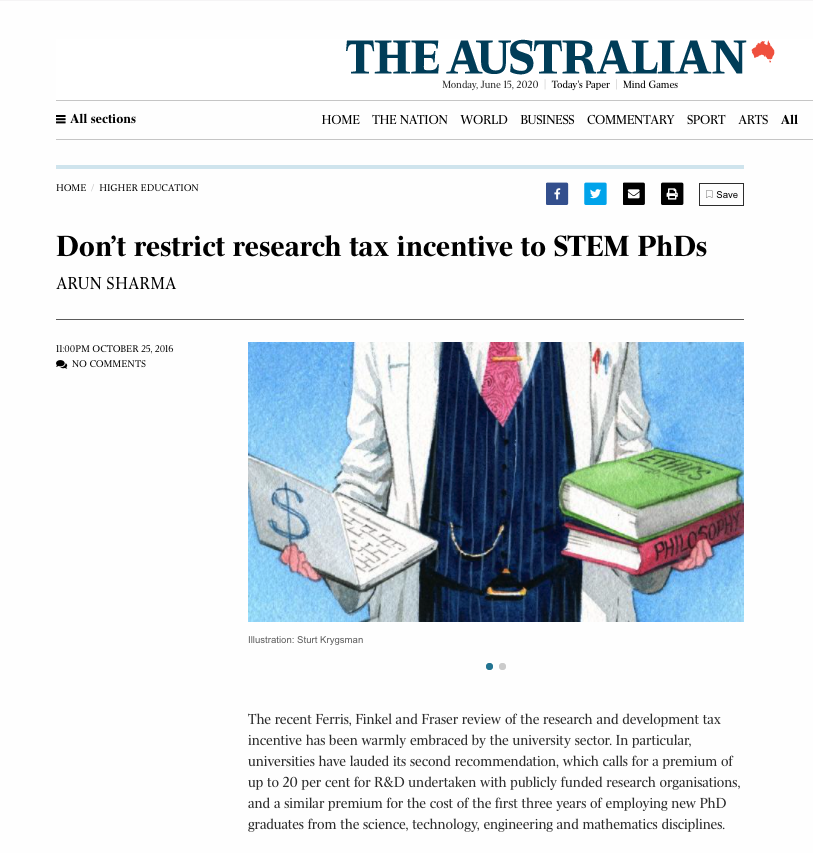Opinion Pieces, Blogs & Presentations

Young Universities Summit
Arun Sharma, deputy vice chancellor (research and commercialisation) at Queensland University of Technology, closes the first day of the 2017 Young Universities Summit

Technology is Transforming the Research Landscape
2015 QUT Grand Challenge Lecture - Technology is Transforming the Research Landscape. Presented by Professor Arun Sharma (Deputy Vice-Chancellor, Research and Commercialisation, QUT).

Don’t restrict research tax incentive to STEM PhDs
The recommendation to restrict the employment tax relief to only STEM PhDs, while understandable, misses an opportunity to profoundly change our business culture in the long run. STEM is undeniably important, but innovation is often more about new business models at the intersection of technology, regulation and consumer behaviour, and it is increasingly aided by design and creative input.

The Human Touch In An Automated World: Are The Creative Arts Ready To Respond?
It is difficult to predict the extent and the rate at which machines will replace humans in the workforce, but it is clear that "rationality" is more vulnerable to automation than emotions, drives and storytelling imperatives that make us human, if only for the reason that the search space for the latter is immensely more complex and vast.

World University Rankings blog: the value of impact assessment
University rankings are often criticised but seldom ignored. This piece argued that an assessment of research impact – beyond scholarly citations – also needs to be included in these rankings. The piece also noted that the criticism about the huge cost burden of research impact exercise did not stack up in the context of the 2014 Research Excellence Framework in the UK.

AARNews Interviews Arun Sharma
Interview with Arun Sharma, Deputy Vice Chancellor (Research & Commercialisation) Queensland University of Technology. Professor Sharma talks about the disconnect in Australia between the research priorities of our universities and the needs of the economy.

Disconnect between research and national needs
Australia underperforms in business-university research collaboration. At times the blame has been attributed to lack of business expenditure in R&D or the inability of universities to engage with business. This piece from 2013 highlighted that much of the blame can be attributed to the differing nature of research expenditure by business and universities.

Close the lecture theatres
Will the twin trends of open source and wiki have a transformational effect on learning content and, as such, on universities? This piece from 2011 appeared before the widespread emergence of MOOC providers in 2012 – “the year of the MOOC” as noted by the New York Times.

Opportunities for universities in the new century
Emeritus Distinguished Professor Arun Sharma’s keynote speech “Opportunities for universities in the new century | Branding, sustainability. International mobility and partnerships of equals”

Basic and applied research: a cricketing perspective
The debate between test cricket and the shorter forms of the game is similar to the structural changes in the research landscape. This piece was in response to the prevalent view in 2009 that applied research was somehow being preferred over basic research in Australia.

Innovation: bridging the cultural gap
A globalised economy being reshaped by the economic resurgence of China and India is in need of more people capable of innovating beyond current business models, but who do so prudently. This piece explores the role of research training in development of such human capital.

Let users decide if research is relevant
Peer review, a necessary criterion of excellence, is no longer a sufficient criterion on its own. The relevance of the peer review group must also enter the equation. This piece from 2005 appeared as part of the discussion in Australia about assessment of the broader impact of research in the lead up to the proposed Research Quality Framework (RQF).